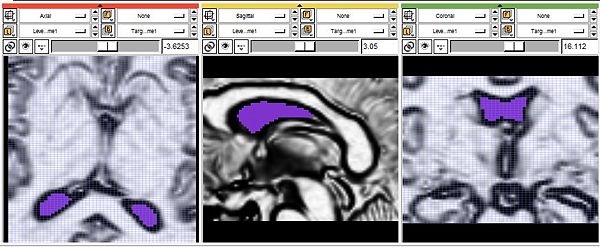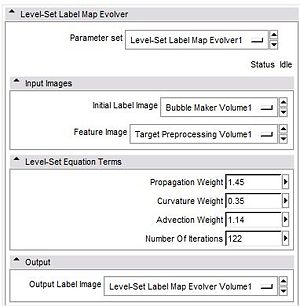Difference between revisions of "Slicer3:Module:Level-Set Label Map Evolver-Documentation"
(→Usage) |
|||
| Line 55: | Line 55: | ||
|} | |} | ||
| − | |||
| − | |||
| − | |||
| − | |||
| − | |||
===Known bugs=== | ===Known bugs=== | ||
Follow this [http://na-mic.org/Mantis/main_page.php link] to the Slicer3 bug tracker. | Follow this [http://na-mic.org/Mantis/main_page.php link] to the Slicer3 bug tracker. | ||
| Line 65: | Line 60: | ||
Follow this [http://na-mic.org/Mantis/main_page.php link] to the Slicer3 bug tracker. Please select the '''usability issue category''' when browsing or contributing. | Follow this [http://na-mic.org/Mantis/main_page.php link] to the Slicer3 bug tracker. Please select the '''usability issue category''' when browsing or contributing. | ||
===Source code & documentation=== | ===Source code & documentation=== | ||
| − | + | Customize following [http://www.na-mic.org/ViewVC/index.cgi/ links] for your module. | |
| − | + | ||
| − | + | [http://www.na-mic.org/Slicer/Documentation/Slicer3/html/ Links] to documentation generated by doxygen. | |
| + | |||
===Acknowledgment=== | ===Acknowledgment=== | ||
| − | + | This work was developed on financial support from the University of Sevilla, Spain. Most of the development took place in the Surgical Planning Laboratory, Harvard Medical School and Brigham and Women's Hospital, under the supervision of Mr. Steve Pieper Ph.D. | |
===References=== | ===References=== | ||
| − | + | V. Caselles, R. Kimmel, and G. Sapiro. Geodesic active contours. International Journal | |
| − | + | on Computer Vision, 22(1):61–97, 1997. | |
| − | |||
| − | |||
Revision as of 19:57, 11 August 2008
Home < Slicer3:Module:Level-Set Label Map Evolver-DocumentationReturn to Slicer Documentation
Module Name
Level-Set Label Map Evolver

|
General Information
Module Type & Category
Type: CLI (Interactive to-be)
Category: Level-Set Segmentation
Authors, Collaborators & Contact
- Carlos S. Mendoza: Universidad de Sevilla
- Contact: carlos.sanchez.mendoza@gmail.com
Module Description
This module is capable of evolving a label image according to a level-set customizable equation for a given number of iterations according to the preprocessed version of a given input image, thus segmenting that image. Ultimately it will be migrated to an interactive approach in which the level-set evolution can be controlled as it is being displayed, running step by step.
The level-set equation incorporates terms for propagation, curvature, and advection.
Usage
Once the Region Selector, the Target Preprocessing and the Bubble Maker modules have been run we can feed the bubble image and preprocessed volume to this module.

|
The parameters have the following meaning:
For further details on parameter interpretation and mathematical formalities address to Caselles et al. paper. |
Known bugs
Follow this link to the Slicer3 bug tracker.
Usability issues
Follow this link to the Slicer3 bug tracker. Please select the usability issue category when browsing or contributing.
Source code & documentation
Customize following links for your module.
Links to documentation generated by doxygen.
Acknowledgment
This work was developed on financial support from the University of Sevilla, Spain. Most of the development took place in the Surgical Planning Laboratory, Harvard Medical School and Brigham and Women's Hospital, under the supervision of Mr. Steve Pieper Ph.D.
References
V. Caselles, R. Kimmel, and G. Sapiro. Geodesic active contours. International Journal on Computer Vision, 22(1):61–97, 1997.